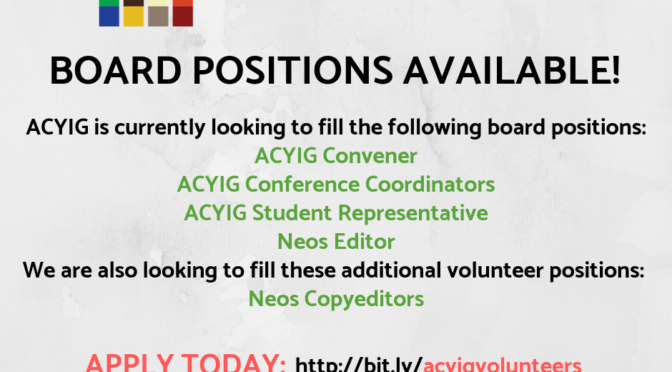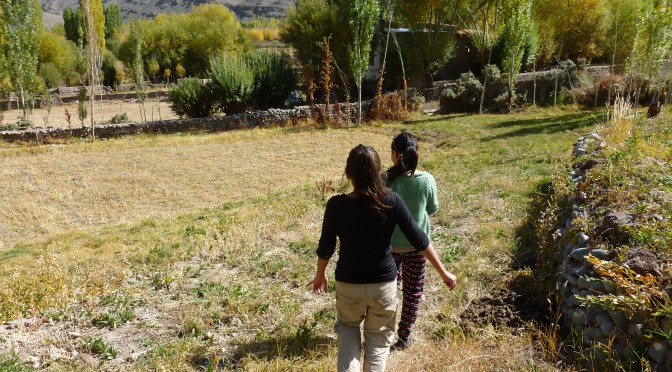The Anthropology of Children and Youth Interest Group (ACYIG) is currently soliciting the following volunteer positions. All positions are open to accept joint appointments between two individuals. Joint appointments are required for positions indicated in plural. Open until filled.
Category Archives: ACYIG Updates
Neos: Call for New Social Media Coordinator
Patrick Alexander will conclude his participation as Social Media Coordinator at the end of this calendar year and we are looking for an enthusiastic, social-media savvy volunteer to take his place. Continue reading Neos: Call for New Social Media Coordinator
CALL FOR NEOS SUBMISSIONS
Dear ACYIG Members,
ACYIG is now soliciting submissions for the October 2016 issue of Neos. We are accepting submissions on a rolling basis between Monday, August 15 and Monday, September 5. The final deadline for submission is Monday, September 5. If possible, please notify me of your intent to submit by the start of the rolling period (August 15), so that I can identify peer reviewers in a timely manner.
ACYIG announces new Website Manager and Blog Editor
ACYIG is pleased to announce that we have a new Website Manager and Blog Editor. Dori Beeler (U of Durham) takes over for Bonnie Richard (UCLA) who built and maintained our site and blog since 2013, turning it into a thriving hub for our online activity and engagement.
Continue reading ACYIG announces new Website Manager and Blog Editor
Last Opportunity for ACYIG Invited Session
There is still room for an ACYIG invited session at the AAA annual meeting in Minneapolis, MN. This session will have “invited status” and increased promotion and exposure by ACYIG. Continue reading Last Opportunity for ACYIG Invited Session
ACYIG Submission Deadline for AAA Extended – Apply Now!
Dear ACYIG members,
The deadline for submitting proposals for the 115th AAA Annual Meeting is coming soon and the deadline for submitting an ACYIG session has been extended to April 8th!. The meeting will be held November 16-20, in Minneapolis, MN. Continue reading ACYIG Submission Deadline for AAA Extended – Apply Now!
ACYIG Invited Session at AAA Annual Meeting: Apply Now!
The deadline for submitting proposals for the 115th AAA Annual Meeting is coming soon. The meeting will be held November 16-20, in Minneapolis, MN.
This year, ACYIG may INVITE one session. This session will receive the “Invited by ACYIG” tagline in the AAA program.
We are now soliciting proposed sessions for ACYIG invited status.
For consideration, please submit your session proposal to both Heather Rae-Espinoza and Jaymelee Kim (Heather.Rae-Espinoza@csulb.edu and kim@findlay.edu) by Friday, April 8, 2015.
Session proposals must include the following information:
- Session title
- Name, affiliation, and email of Session Organizer
- Session abstract (no more than 500 words)
- Names, affiliations, emails, and paper titles for all session members
- Name(s) and affiliation(s) of discussant(s), if applicable
The AAA’s call for papers follows:
The 115th Annual Meeting theme, ‘Evidence, Accident, Discovery’, raises issues central to debates within both anthropology and politics in a neoliberal, climate-changing, social media-networked era: What counts as evidence? What does evidence count for? What are the underlying causes and foreseeability of violence and catastrophes? How is misfortune interpreted, and causality, attributed in cases of humanly-preventable harm? And in the give and take of relationships on which anthropological evidence typically depends, Who gets to claim that they discovered something? We welcome proposals that debate these and other questions stimulated by the conference theme, in the opportunity that our annual meeting provides for “big tent” debate.
Want to Liven Up Your Teaching and Scholarship Related to Children and Youth?
The ACYIG website provides access to a vast amount of resources to facilitate
teaching and research.
By Bonnie Richard (Website Manager & Blog Editor) & Sara Thiam (Content Coordinator for Blog & Social Media)
Our interest group has developed a very useful (and always growing) repository of resources for teaching and research related to the anthropology of children, youth, and related topics. Continue reading Want to Liven Up Your Teaching and Scholarship Related to Children and Youth?


